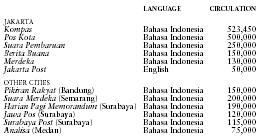Indonesia - Media
The government owns and operates postal services and telecommunications facilities through Perumtel, a state enterprise. In 1998 there were over 5.5 million mainline telephones in Indonesia as well as an additional 1.07 million cellular phones in use. The Indonesian-owned telecommunications satellite Palapa B was launched in 1983.
As of 1998, there were 678 AM and 43 FM radio stations and 41 television stations (18 government-owned and 23 commercial). Programs originating in Jakarta are in Bahasa Indonesia; programs from regional stations are usually in local languages or dialects. The overseas service (Voice of Indonesia) broadcasts 11 hours daily in Arabic, Chinese, English, French, German, Japanese, Malay, and Thai. Television service was inaugurated in 1962. In 1995 there were three television networks, TV-Indonesia (TVRI), Rejawali Citra TV, and an educational network in Jakarta. In 2000 there were 157 radios and 149 television sets for every 1,000 people. In 2001, there were 2 million Internet subscribers served by 24 service providers.
Most newspapers are published in Bahasa Indonesia, with a small number appearing in local dialects, English, and Chinese. The leading dailies, with their estimated 2002 circulations, are as follows:

| LANGUAGE | CIRCULATION | |
| JAKARTA | ||
| Kompas | Bahasa Indonesia | 523,450 |
| Pos Kota | Bahasa Indonesia | 500,000 |
| Suara Pembaruan | Bahasa Indonesia | 250,000 |
| Berita Buana | Bahasa Indonesia | 150,000 |
| Merdeka | Bahasa Indonesia | 130,000 |
| Jakarta Post | English | 50,000 |
| OTHER CITIES | ||
| Pikiran Rakyat (Bandung) | Bahasa Indonesia | 150,000 |
| Suara Merdeka (Semarang) | Bahasa Indonesia | 200,000 |
| Harian Pagi Memorandum (Surabaya) | Bahasa Indonesia | 190,000 |
| Jawa Pos (Surabaya) | Bahasa Indonesia | 120,000 |
| Surabaya Post (Surabaya) | Bahasa Indonesia | 115,000 |
| Analisa (Medan) | Bahasa Indonesia | 75,000 |
The constitution declares that everyone has the "right to freedom of opinion and expression." Journalistic activities of foreigners, however, are limited in accordance with the policy that "freedom of expression" does not permit interference in domestic affairs or dissemination of "foreign ideologies" detrimental to the Indonesian system of government. The government censors foreign films and publications, and Indonesian newspapers have been temporarily closed down for violating news guidelines. In 1982, a new press law established a Press Council of government officials, journalists, and scholars empowered to decide what news may be printed. The government began to issue and revoke "publishing licenses" in 1984 to control the media. In 1994 the licenses of three well-known news magazines were revoked.
Comment about this article, ask questions, or add new information about this topic: